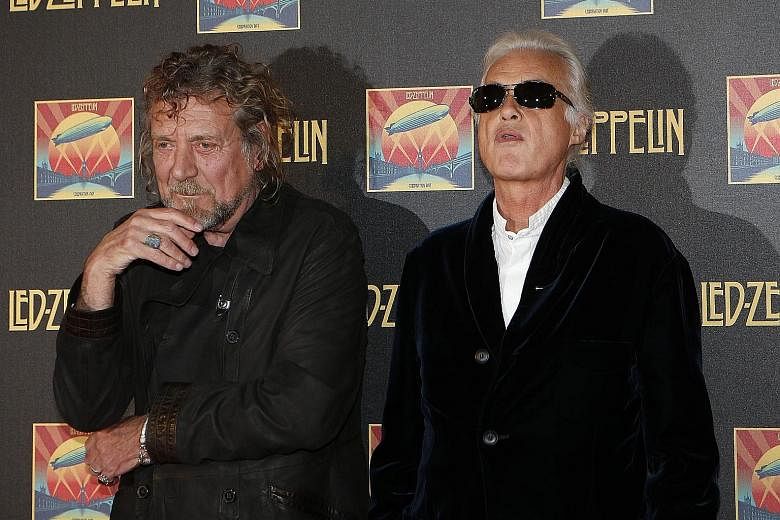NEW YORK • Beyonce is on tour, Drake is setting streaming records and Taylor Swift has split up with her boyfriend. But next week, the most gripping news for the music industry may come out of a federal courtroom in Los Angeles.
There, Jimmy Page and Robert Plant of Led Zeppelin will be defending themselves against a lawsuit claiming that parts of Stairway To Heaven - the band's signature hit and a pillar of rock radio since the song's release in 1971 - were copied from Taurus, an instrumental tune by the lesser-known group Spirit.
The trial, set to start on June 14 with Page and Plant expected to be in attendance, may prove fascinating legal theatre for fans. But it will also be closely watched by a music business that is grappling with a series of recent copyright decisions.
Last year, a federal jury found that Robin Thicke and Pharrell Williams had copied Marvin Gaye in Thicke's 2013 hit song Blurred Lines, and ordered Thicke and Williams to pay US$7.4 million (later reduced to US$5.3 million).
Industry commentators said the decision penalised elements of songs long thought of as being fair game, such as the generic "feel" of a recording, and warned of a chilling effect on creativity.
That case and others like it, lawyers and music executives say, have raised new questions about songwriting and copyright - issues long a part of the background of litigation in the industry. They have also led to increased scrutiny whenever a song's credits are challenged or changed, as they were a year ago when co-writers were quietly added to Mark Ronson's retro hit Uptown Funk.
"It used to be that melody and lyrics were the basis of all infringement claims, but now that's fuzzier," said Mr Jay Rosenthal, a music industry lawyer and the former general counsel of the National Music Publishers' Association. "Blurred Lines has opened the door and made rhythm and beats and 'feel' perhaps proprietary, where before it was not the case."
The Led Zeppelin case was filed two years ago by a trustee representing the songs of Randy Wolfe, also known as Randy California, one of Spirit's main songwriters, who died in 1997. But the dispute has echoes of Blurred Lines and is being watched as a test of the limits of copyright.
The case focuses on the famous opening of Stairway To Heaven, in which an acoustic guitar plays arpeggiated chords in a descending pattern. That part, the suit contends, copied Spirit's Taurus, released in 1968. In the suit's complaint, Mr Francis Malofiy, the lead lawyer representing the plaintiff, said that Led Zeppelin's members heard Spirit's song when the bands crossed paths on the road early in their careers. The suit, filed on behalf of Michael Skidmore, the trustee, accused Led Zeppelin of copyright infringement and the novel claim (duly struck down by the judge) of "falsification of rock 'n' roll history". Mr Malofiy has said he is seeking as much as US$40 million (S$54 million) in damages.
Wolfe never pursued a lawsuit during his lifetime.
But Skidmore, a customs consultant and former music journalist who has controlled Wolfe's trust since 2009, filed the case in 2014, shortly after a Supreme Court ruling that said that copyright infringement cases could proceed even after long delays.
Page and Plant deny ever having heard Taurus before the case came to light and say Stairway To Heaven was written independently. Yet over the years, the band has settled numerous challenges of plagiarism by adding other songwriters' credits to its albums. In 2012, for example, the band settled a suit by Jake Holmes over Dazed And Confused, and subsequent releases of the song on Led Zeppelin's albums list it as being written by Page and "inspired by Jake Holmes".
Led Zeppelin also argues that the commonalities between the songs are generic elements in musical composition that go back decades, and the core of the pieces in question are little more than a basic chord progression.
But in denying the band's request for summary judgment, United States District Court judge R. Gary Klausner found that there was enough similarity to warrant a test at trial, in a phrase that could almost be an excerpt from a musicology textbook: "While it is true that a descending chromatic four-chord progression is a common convention that abounds in the music industry, the similarities here transcend the core structure."
A jury will decide just how similar they are.
NEW YORK TIMES

